University of Suffolk Nursing Practice One Insight Portfolio 2018
VerifiedAdded on 2021/10/28
|25
|7655
|86
Portfolio
AI Summary
This portfolio, submitted by Agatha Etcheri, a student at the University of Suffolk, for the Nursing Practice One module (0218 Cohort), explores various aspects of nursing practice, specifically focusing on insight placements in child health, mental health, mother and newborn care, and learning disabilities. The assignment requires students to demonstrate their understanding of person-centred care and professional responsibilities, including safeguarding vulnerable individuals. The portfolio includes activities on the role of the child health nurse, the philosophy of child and family-centred care, and the role of specialist nurses in preparing young people with chronic illnesses for transition to adult services. The student provides detailed discussions on these topics, referencing relevant literature and videos, highlighting differences in nursing roles, advantages and disadvantages of family-centred care, and the significance of specialist nurses in managing chronic conditions. The portfolio adheres to the requirements of the Nursing and Midwifery Council and includes comprehensive responses to specific questions and tasks within each insight placement, demonstrating the student's knowledge and understanding of the subject matter.
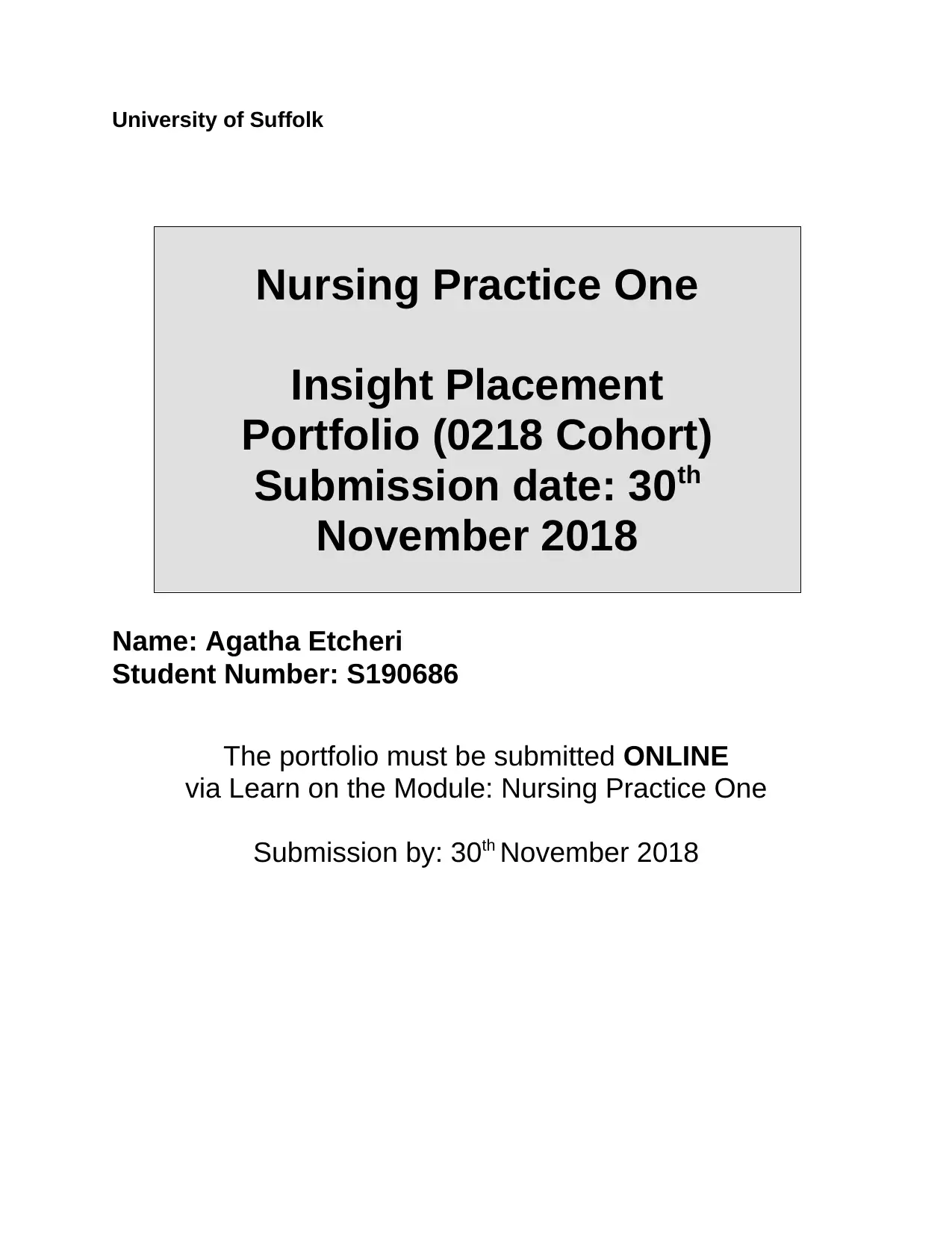
University of Suffolk
Nursing Practice One
Insight Placement
Portfolio (0218 Cohort)
Submission date: 30th
November 2018
Name: Agatha Etcheri
Student Number: S190686
The portfolio must be submitted ONLINE
via Learn on the Module: Nursing Practice One
Submission by: 30th November 2018
Nursing Practice One
Insight Placement
Portfolio (0218 Cohort)
Submission date: 30th
November 2018
Name: Agatha Etcheri
Student Number: S190686
The portfolio must be submitted ONLINE
via Learn on the Module: Nursing Practice One
Submission by: 30th November 2018
Paraphrase This Document
Need a fresh take? Get an instant paraphrase of this document with our AI Paraphraser
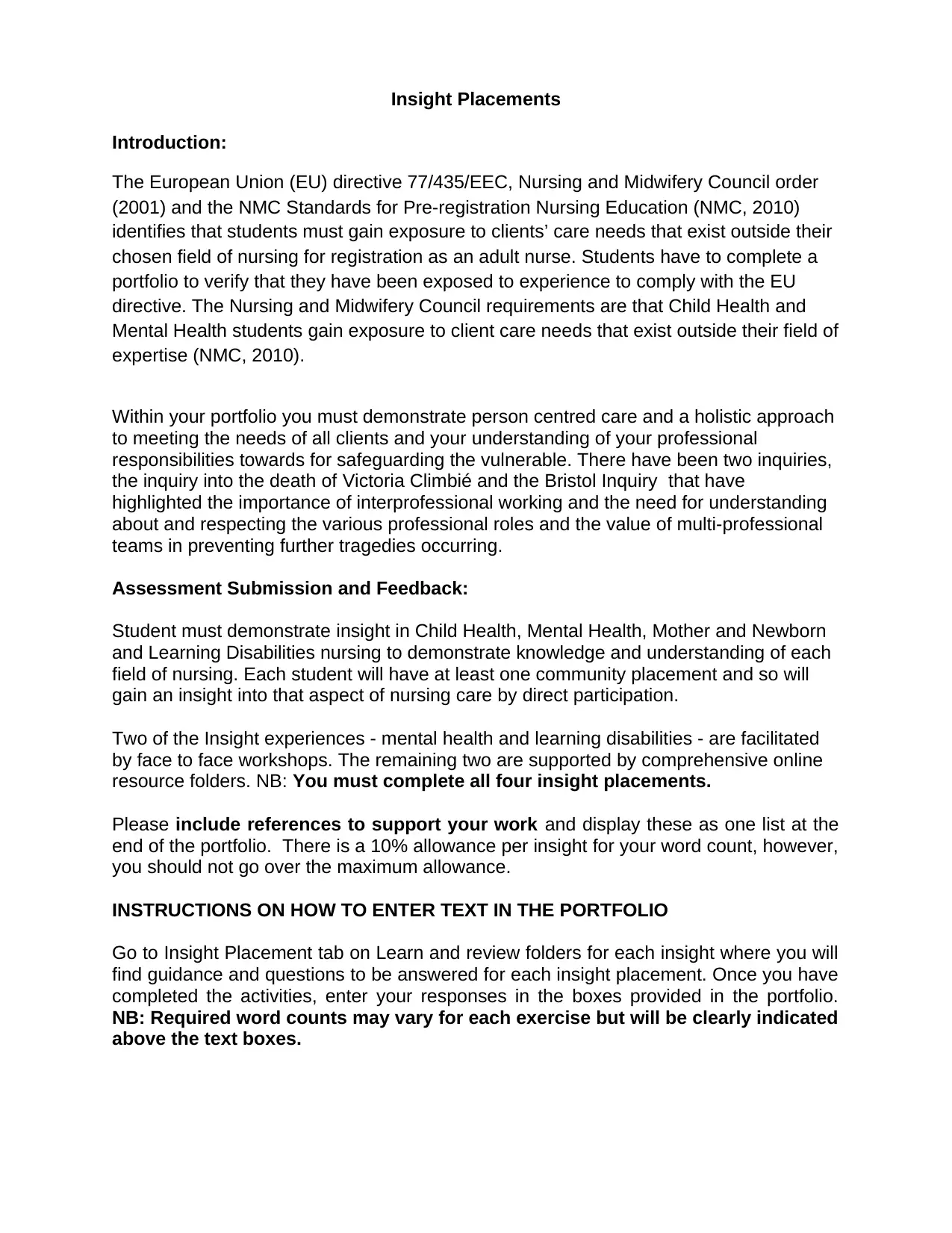
Insight Placements
Introduction:
The European Union (EU) directive 77/435/EEC, Nursing and Midwifery Council order
(2001) and the NMC Standards for Pre-registration Nursing Education (NMC, 2010)
identifies that students must gain exposure to clients’ care needs that exist outside their
chosen field of nursing for registration as an adult nurse. Students have to complete a
portfolio to verify that they have been exposed to experience to comply with the EU
directive. The Nursing and Midwifery Council requirements are that Child Health and
Mental Health students gain exposure to client care needs that exist outside their field of
expertise (NMC, 2010).
Within your portfolio you must demonstrate person centred care and a holistic approach
to meeting the needs of all clients and your understanding of your professional
responsibilities towards for safeguarding the vulnerable. There have been two inquiries,
the inquiry into the death of Victoria Climbié and the Bristol Inquiry that have
highlighted the importance of interprofessional working and the need for understanding
about and respecting the various professional roles and the value of multi-professional
teams in preventing further tragedies occurring.
Assessment Submission and Feedback:
Student must demonstrate insight in Child Health, Mental Health, Mother and Newborn
and Learning Disabilities nursing to demonstrate knowledge and understanding of each
field of nursing. Each student will have at least one community placement and so will
gain an insight into that aspect of nursing care by direct participation.
Two of the Insight experiences - mental health and learning disabilities - are facilitated
by face to face workshops. The remaining two are supported by comprehensive online
resource folders. NB: You must complete all four insight placements.
Please include references to support your work and display these as one list at the
end of the portfolio. There is a 10% allowance per insight for your word count, however,
you should not go over the maximum allowance.
INSTRUCTIONS ON HOW TO ENTER TEXT IN THE PORTFOLIO
Go to Insight Placement tab on Learn and review folders for each insight where you will
find guidance and questions to be answered for each insight placement. Once you have
completed the activities, enter your responses in the boxes provided in the portfolio.
NB: Required word counts may vary for each exercise but will be clearly indicated
above the text boxes.
Introduction:
The European Union (EU) directive 77/435/EEC, Nursing and Midwifery Council order
(2001) and the NMC Standards for Pre-registration Nursing Education (NMC, 2010)
identifies that students must gain exposure to clients’ care needs that exist outside their
chosen field of nursing for registration as an adult nurse. Students have to complete a
portfolio to verify that they have been exposed to experience to comply with the EU
directive. The Nursing and Midwifery Council requirements are that Child Health and
Mental Health students gain exposure to client care needs that exist outside their field of
expertise (NMC, 2010).
Within your portfolio you must demonstrate person centred care and a holistic approach
to meeting the needs of all clients and your understanding of your professional
responsibilities towards for safeguarding the vulnerable. There have been two inquiries,
the inquiry into the death of Victoria Climbié and the Bristol Inquiry that have
highlighted the importance of interprofessional working and the need for understanding
about and respecting the various professional roles and the value of multi-professional
teams in preventing further tragedies occurring.
Assessment Submission and Feedback:
Student must demonstrate insight in Child Health, Mental Health, Mother and Newborn
and Learning Disabilities nursing to demonstrate knowledge and understanding of each
field of nursing. Each student will have at least one community placement and so will
gain an insight into that aspect of nursing care by direct participation.
Two of the Insight experiences - mental health and learning disabilities - are facilitated
by face to face workshops. The remaining two are supported by comprehensive online
resource folders. NB: You must complete all four insight placements.
Please include references to support your work and display these as one list at the
end of the portfolio. There is a 10% allowance per insight for your word count, however,
you should not go over the maximum allowance.
INSTRUCTIONS ON HOW TO ENTER TEXT IN THE PORTFOLIO
Go to Insight Placement tab on Learn and review folders for each insight where you will
find guidance and questions to be answered for each insight placement. Once you have
completed the activities, enter your responses in the boxes provided in the portfolio.
NB: Required word counts may vary for each exercise but will be clearly indicated
above the text boxes.
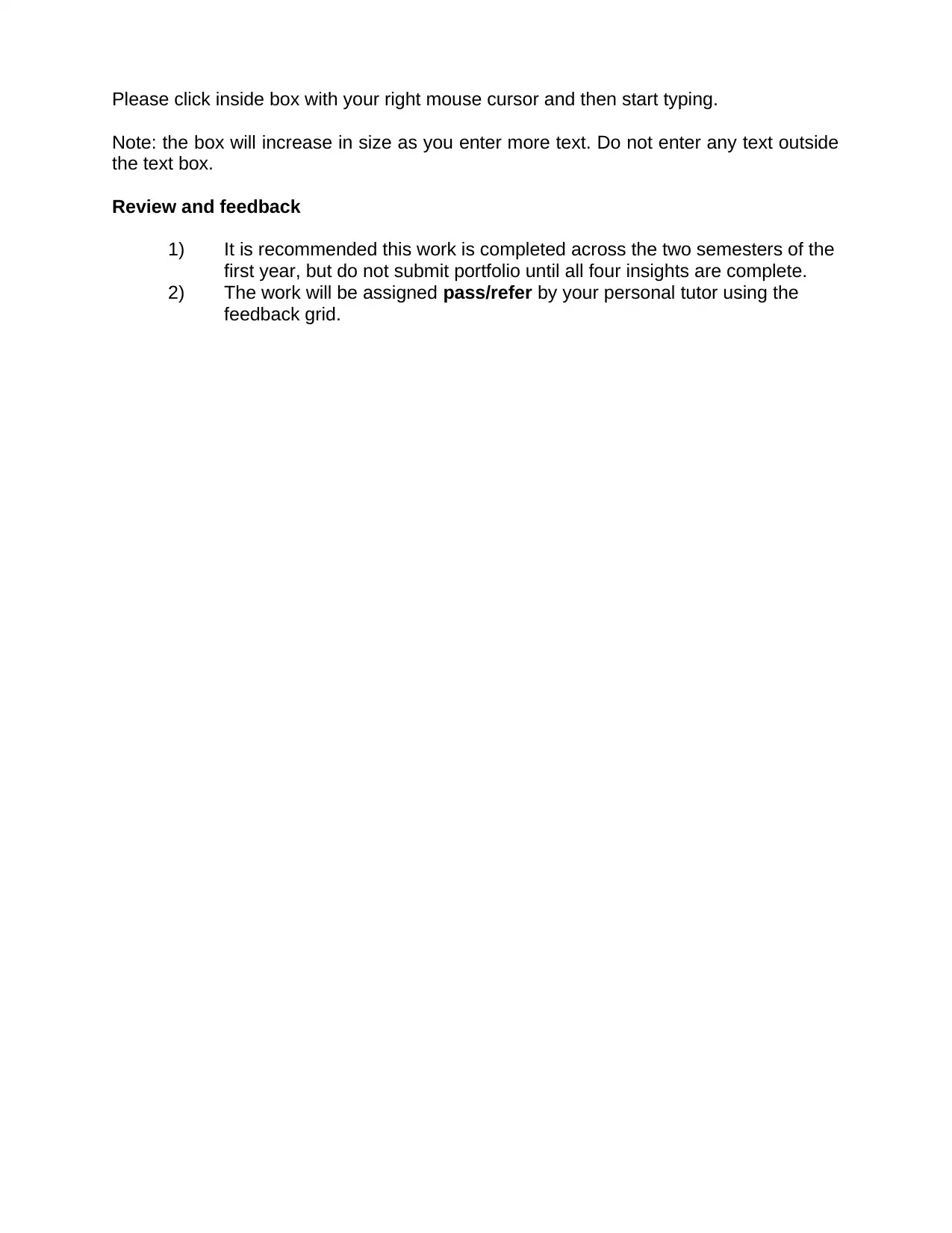
Please click inside box with your right mouse cursor and then start typing.
Note: the box will increase in size as you enter more text. Do not enter any text outside
the text box.
Review and feedback
1) It is recommended this work is completed across the two semesters of the
first year, but do not submit portfolio until all four insights are complete.
2) The work will be assigned pass/refer by your personal tutor using the
feedback grid.
Note: the box will increase in size as you enter more text. Do not enter any text outside
the text box.
Review and feedback
1) It is recommended this work is completed across the two semesters of the
first year, but do not submit portfolio until all four insights are complete.
2) The work will be assigned pass/refer by your personal tutor using the
feedback grid.
⊘ This is a preview!⊘
Do you want full access?
Subscribe today to unlock all pages.

Trusted by 1+ million students worldwide
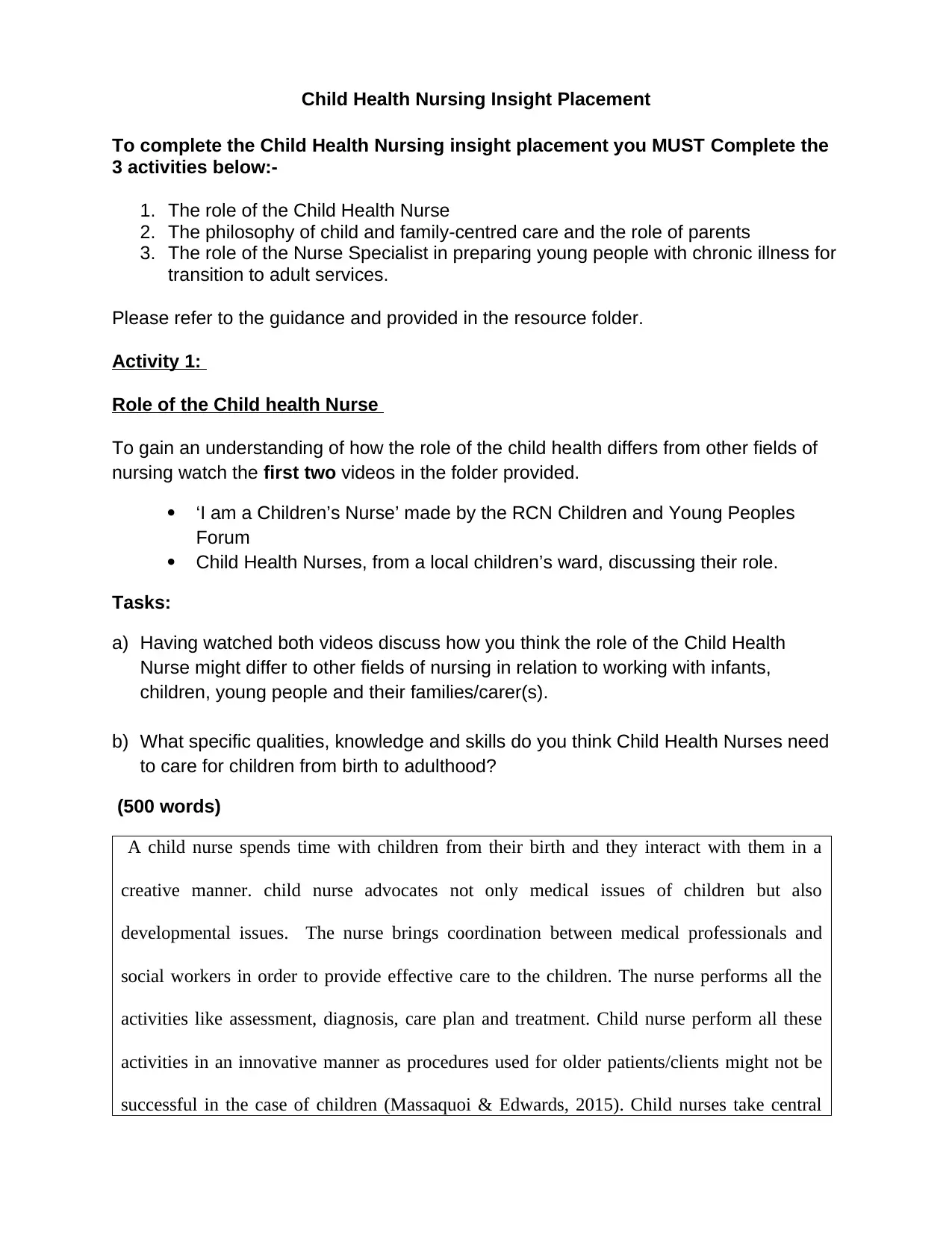
Child Health Nursing Insight Placement
To complete the Child Health Nursing insight placement you MUST Complete the
3 activities below:-
1. The role of the Child Health Nurse
2. The philosophy of child and family-centred care and the role of parents
3. The role of the Nurse Specialist in preparing young people with chronic illness for
transition to adult services.
Please refer to the guidance and provided in the resource folder.
Activity 1:
Role of the Child health Nurse
To gain an understanding of how the role of the child health differs from other fields of
nursing watch the first two videos in the folder provided.
‘I am a Children’s Nurse’ made by the RCN Children and Young Peoples
Forum
Child Health Nurses, from a local children’s ward, discussing their role.
Tasks:
a) Having watched both videos discuss how you think the role of the Child Health
Nurse might differ to other fields of nursing in relation to working with infants,
children, young people and their families/carer(s).
b) What specific qualities, knowledge and skills do you think Child Health Nurses need
to care for children from birth to adulthood?
(500 words)
A child nurse spends time with children from their birth and they interact with them in a
creative manner. child nurse advocates not only medical issues of children but also
developmental issues. The nurse brings coordination between medical professionals and
social workers in order to provide effective care to the children. The nurse performs all the
activities like assessment, diagnosis, care plan and treatment. Child nurse perform all these
activities in an innovative manner as procedures used for older patients/clients might not be
successful in the case of children (Massaquoi & Edwards, 2015). Child nurses take central
To complete the Child Health Nursing insight placement you MUST Complete the
3 activities below:-
1. The role of the Child Health Nurse
2. The philosophy of child and family-centred care and the role of parents
3. The role of the Nurse Specialist in preparing young people with chronic illness for
transition to adult services.
Please refer to the guidance and provided in the resource folder.
Activity 1:
Role of the Child health Nurse
To gain an understanding of how the role of the child health differs from other fields of
nursing watch the first two videos in the folder provided.
‘I am a Children’s Nurse’ made by the RCN Children and Young Peoples
Forum
Child Health Nurses, from a local children’s ward, discussing their role.
Tasks:
a) Having watched both videos discuss how you think the role of the Child Health
Nurse might differ to other fields of nursing in relation to working with infants,
children, young people and their families/carer(s).
b) What specific qualities, knowledge and skills do you think Child Health Nurses need
to care for children from birth to adulthood?
(500 words)
A child nurse spends time with children from their birth and they interact with them in a
creative manner. child nurse advocates not only medical issues of children but also
developmental issues. The nurse brings coordination between medical professionals and
social workers in order to provide effective care to the children. The nurse performs all the
activities like assessment, diagnosis, care plan and treatment. Child nurse perform all these
activities in an innovative manner as procedures used for older patients/clients might not be
successful in the case of children (Massaquoi & Edwards, 2015). Child nurses take central
Paraphrase This Document
Need a fresh take? Get an instant paraphrase of this document with our AI Paraphraser
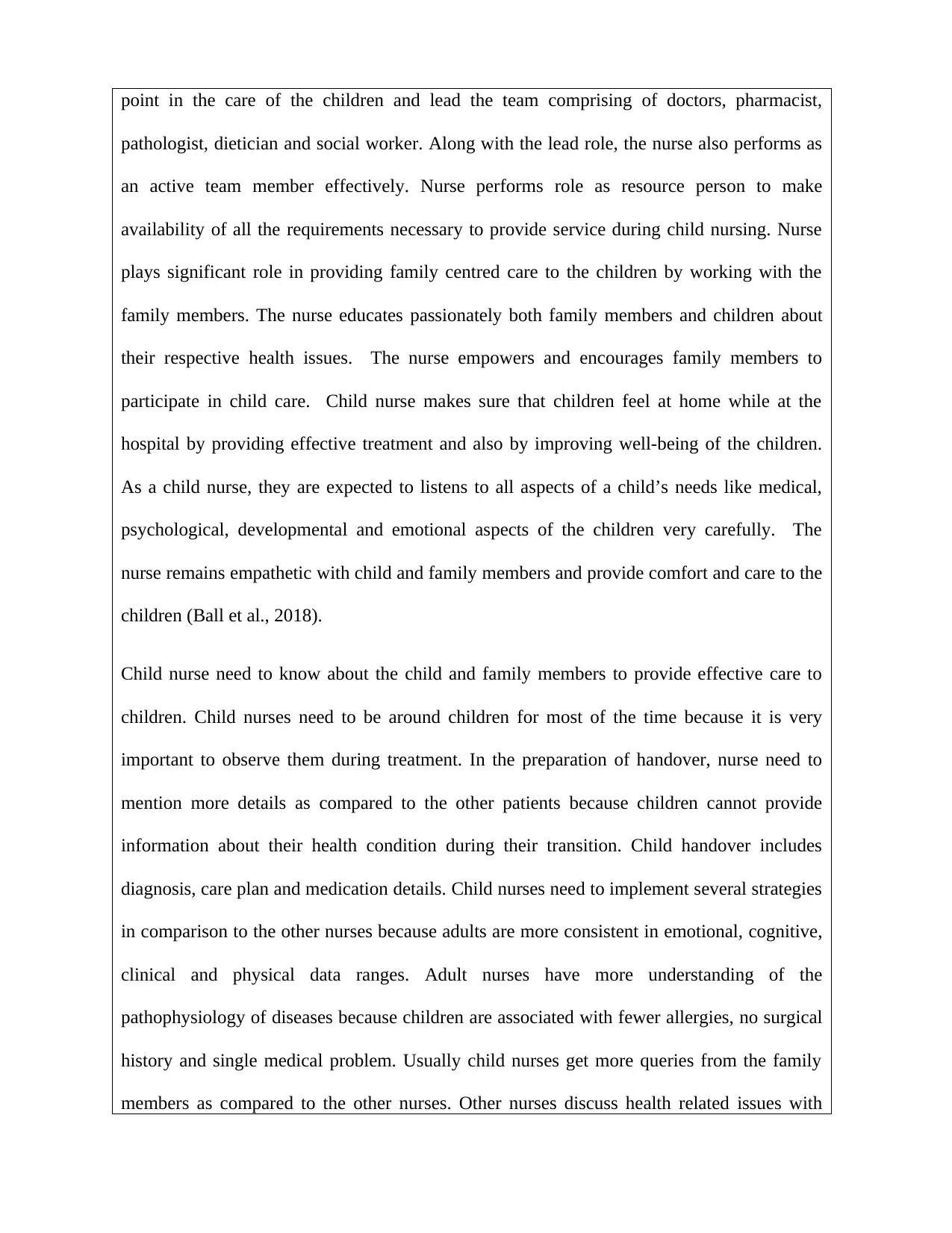
point in the care of the children and lead the team comprising of doctors, pharmacist,
pathologist, dietician and social worker. Along with the lead role, the nurse also performs as
an active team member effectively. Nurse performs role as resource person to make
availability of all the requirements necessary to provide service during child nursing. Nurse
plays significant role in providing family centred care to the children by working with the
family members. The nurse educates passionately both family members and children about
their respective health issues. The nurse empowers and encourages family members to
participate in child care. Child nurse makes sure that children feel at home while at the
hospital by providing effective treatment and also by improving well-being of the children.
As a child nurse, they are expected to listens to all aspects of a child’s needs like medical,
psychological, developmental and emotional aspects of the children very carefully. The
nurse remains empathetic with child and family members and provide comfort and care to the
children (Ball et al., 2018).
Child nurse need to know about the child and family members to provide effective care to
children. Child nurses need to be around children for most of the time because it is very
important to observe them during treatment. In the preparation of handover, nurse need to
mention more details as compared to the other patients because children cannot provide
information about their health condition during their transition. Child handover includes
diagnosis, care plan and medication details. Child nurses need to implement several strategies
in comparison to the other nurses because adults are more consistent in emotional, cognitive,
clinical and physical data ranges. Adult nurses have more understanding of the
pathophysiology of diseases because children are associated with fewer allergies, no surgical
history and single medical problem. Usually child nurses get more queries from the family
members as compared to the other nurses. Other nurses discuss health related issues with
pathologist, dietician and social worker. Along with the lead role, the nurse also performs as
an active team member effectively. Nurse performs role as resource person to make
availability of all the requirements necessary to provide service during child nursing. Nurse
plays significant role in providing family centred care to the children by working with the
family members. The nurse educates passionately both family members and children about
their respective health issues. The nurse empowers and encourages family members to
participate in child care. Child nurse makes sure that children feel at home while at the
hospital by providing effective treatment and also by improving well-being of the children.
As a child nurse, they are expected to listens to all aspects of a child’s needs like medical,
psychological, developmental and emotional aspects of the children very carefully. The
nurse remains empathetic with child and family members and provide comfort and care to the
children (Ball et al., 2018).
Child nurse need to know about the child and family members to provide effective care to
children. Child nurses need to be around children for most of the time because it is very
important to observe them during treatment. In the preparation of handover, nurse need to
mention more details as compared to the other patients because children cannot provide
information about their health condition during their transition. Child handover includes
diagnosis, care plan and medication details. Child nurses need to implement several strategies
in comparison to the other nurses because adults are more consistent in emotional, cognitive,
clinical and physical data ranges. Adult nurses have more understanding of the
pathophysiology of diseases because children are associated with fewer allergies, no surgical
history and single medical problem. Usually child nurses get more queries from the family
members as compared to the other nurses. Other nurses discuss health related issues with
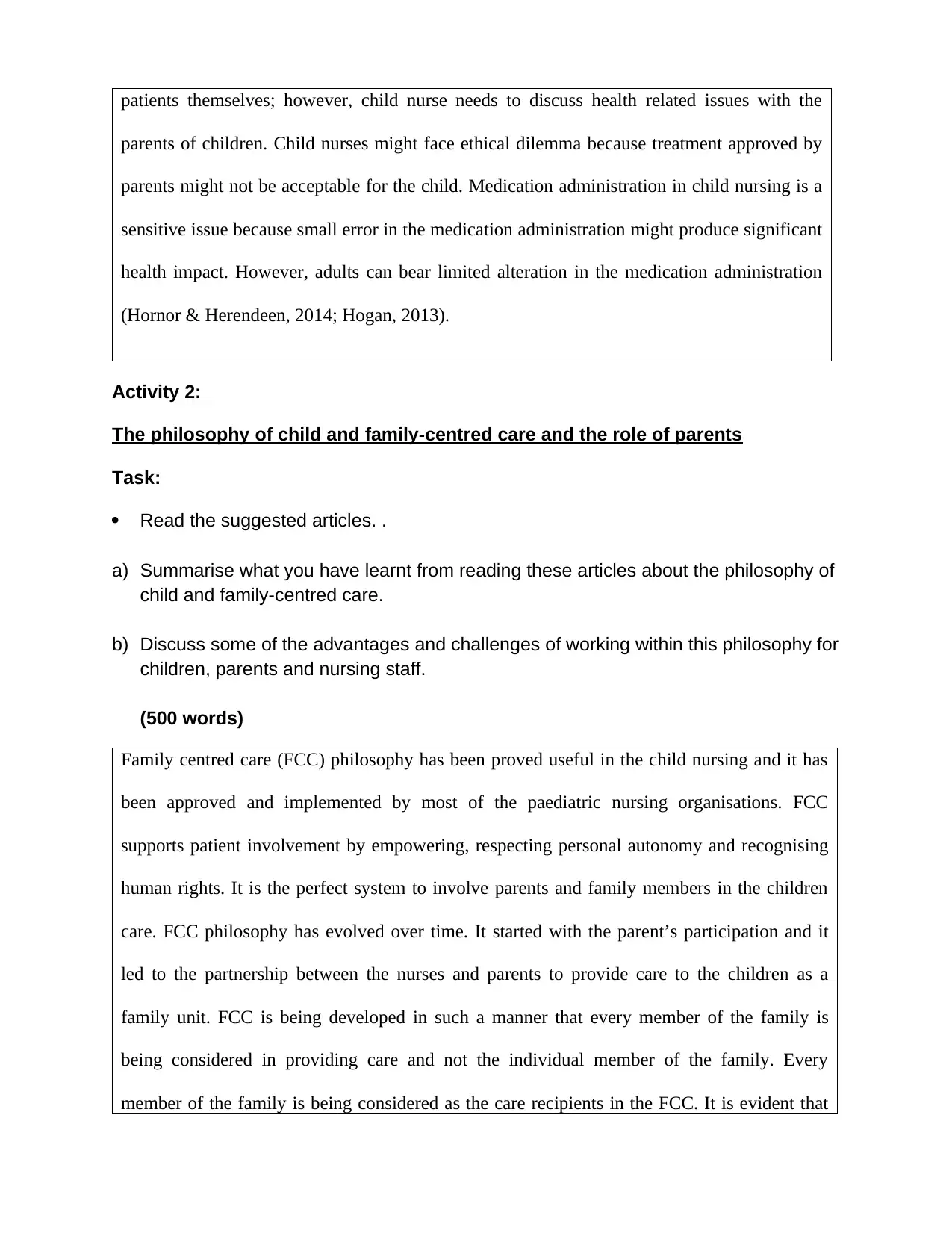
patients themselves; however, child nurse needs to discuss health related issues with the
parents of children. Child nurses might face ethical dilemma because treatment approved by
parents might not be acceptable for the child. Medication administration in child nursing is a
sensitive issue because small error in the medication administration might produce significant
health impact. However, adults can bear limited alteration in the medication administration
(Hornor & Herendeen, 2014; Hogan, 2013).
Activity 2:
The philosophy of child and family-centred care and the role of parents
Task:
Read the suggested articles. .
a) Summarise what you have learnt from reading these articles about the philosophy of
child and family-centred care.
b) Discuss some of the advantages and challenges of working within this philosophy for
children, parents and nursing staff.
(500 words)
Family centred care (FCC) philosophy has been proved useful in the child nursing and it has
been approved and implemented by most of the paediatric nursing organisations. FCC
supports patient involvement by empowering, respecting personal autonomy and recognising
human rights. It is the perfect system to involve parents and family members in the children
care. FCC philosophy has evolved over time. It started with the parent’s participation and it
led to the partnership between the nurses and parents to provide care to the children as a
family unit. FCC is being developed in such a manner that every member of the family is
being considered in providing care and not the individual member of the family. Every
member of the family is being considered as the care recipients in the FCC. It is evident that
parents of children. Child nurses might face ethical dilemma because treatment approved by
parents might not be acceptable for the child. Medication administration in child nursing is a
sensitive issue because small error in the medication administration might produce significant
health impact. However, adults can bear limited alteration in the medication administration
(Hornor & Herendeen, 2014; Hogan, 2013).
Activity 2:
The philosophy of child and family-centred care and the role of parents
Task:
Read the suggested articles. .
a) Summarise what you have learnt from reading these articles about the philosophy of
child and family-centred care.
b) Discuss some of the advantages and challenges of working within this philosophy for
children, parents and nursing staff.
(500 words)
Family centred care (FCC) philosophy has been proved useful in the child nursing and it has
been approved and implemented by most of the paediatric nursing organisations. FCC
supports patient involvement by empowering, respecting personal autonomy and recognising
human rights. It is the perfect system to involve parents and family members in the children
care. FCC philosophy has evolved over time. It started with the parent’s participation and it
led to the partnership between the nurses and parents to provide care to the children as a
family unit. FCC is being developed in such a manner that every member of the family is
being considered in providing care and not the individual member of the family. Every
member of the family is being considered as the care recipients in the FCC. It is evident that
⊘ This is a preview!⊘
Do you want full access?
Subscribe today to unlock all pages.

Trusted by 1+ million students worldwide
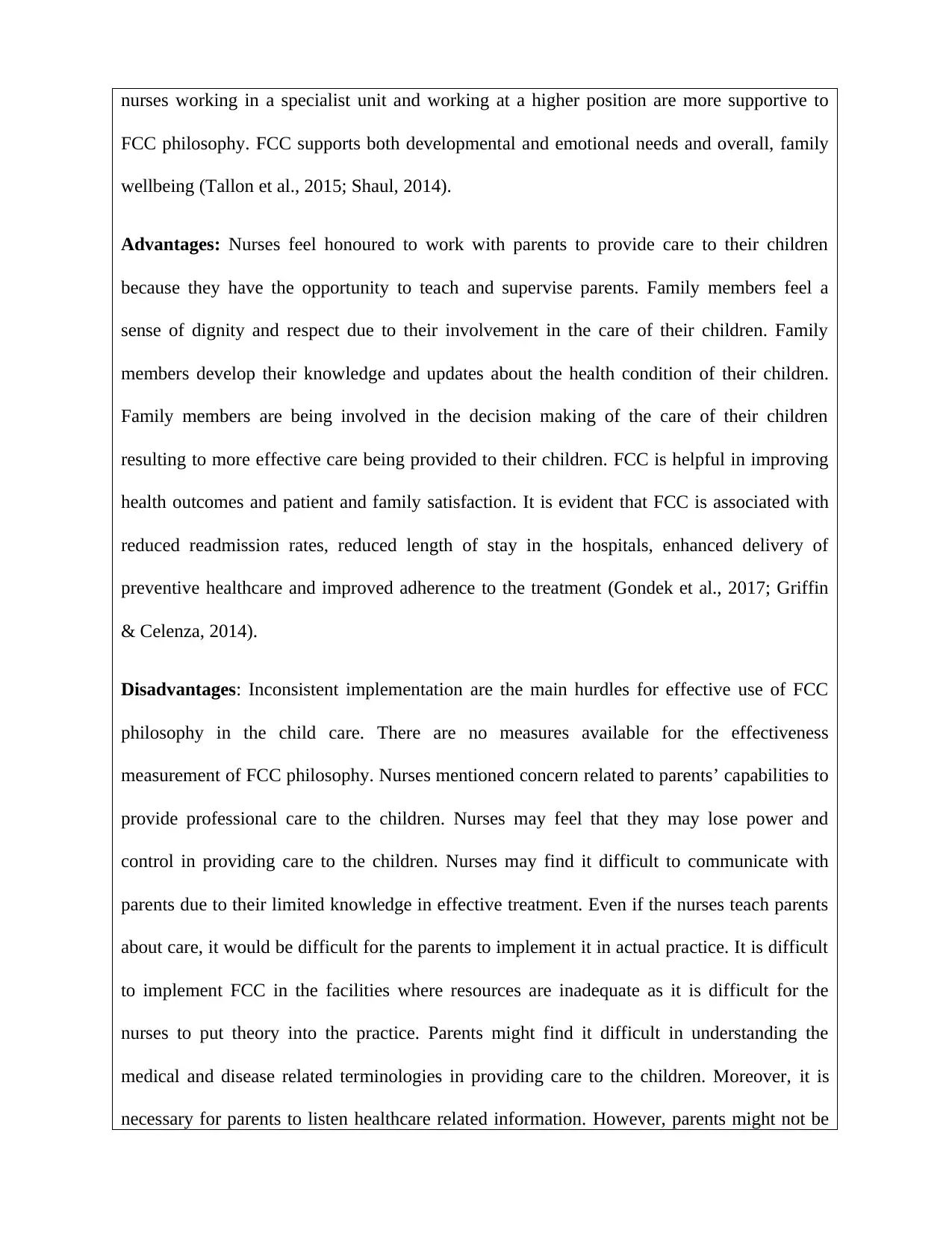
nurses working in a specialist unit and working at a higher position are more supportive to
FCC philosophy. FCC supports both developmental and emotional needs and overall, family
wellbeing (Tallon et al., 2015; Shaul, 2014).
Advantages: Nurses feel honoured to work with parents to provide care to their children
because they have the opportunity to teach and supervise parents. Family members feel a
sense of dignity and respect due to their involvement in the care of their children. Family
members develop their knowledge and updates about the health condition of their children.
Family members are being involved in the decision making of the care of their children
resulting to more effective care being provided to their children. FCC is helpful in improving
health outcomes and patient and family satisfaction. It is evident that FCC is associated with
reduced readmission rates, reduced length of stay in the hospitals, enhanced delivery of
preventive healthcare and improved adherence to the treatment (Gondek et al., 2017; Griffin
& Celenza, 2014).
Disadvantages: Inconsistent implementation are the main hurdles for effective use of FCC
philosophy in the child care. There are no measures available for the effectiveness
measurement of FCC philosophy. Nurses mentioned concern related to parents’ capabilities to
provide professional care to the children. Nurses may feel that they may lose power and
control in providing care to the children. Nurses may find it difficult to communicate with
parents due to their limited knowledge in effective treatment. Even if the nurses teach parents
about care, it would be difficult for the parents to implement it in actual practice. It is difficult
to implement FCC in the facilities where resources are inadequate as it is difficult for the
nurses to put theory into the practice. Parents might find it difficult in understanding the
medical and disease related terminologies in providing care to the children. Moreover, it is
necessary for parents to listen healthcare related information. However, parents might not be
FCC philosophy. FCC supports both developmental and emotional needs and overall, family
wellbeing (Tallon et al., 2015; Shaul, 2014).
Advantages: Nurses feel honoured to work with parents to provide care to their children
because they have the opportunity to teach and supervise parents. Family members feel a
sense of dignity and respect due to their involvement in the care of their children. Family
members develop their knowledge and updates about the health condition of their children.
Family members are being involved in the decision making of the care of their children
resulting to more effective care being provided to their children. FCC is helpful in improving
health outcomes and patient and family satisfaction. It is evident that FCC is associated with
reduced readmission rates, reduced length of stay in the hospitals, enhanced delivery of
preventive healthcare and improved adherence to the treatment (Gondek et al., 2017; Griffin
& Celenza, 2014).
Disadvantages: Inconsistent implementation are the main hurdles for effective use of FCC
philosophy in the child care. There are no measures available for the effectiveness
measurement of FCC philosophy. Nurses mentioned concern related to parents’ capabilities to
provide professional care to the children. Nurses may feel that they may lose power and
control in providing care to the children. Nurses may find it difficult to communicate with
parents due to their limited knowledge in effective treatment. Even if the nurses teach parents
about care, it would be difficult for the parents to implement it in actual practice. It is difficult
to implement FCC in the facilities where resources are inadequate as it is difficult for the
nurses to put theory into the practice. Parents might find it difficult in understanding the
medical and disease related terminologies in providing care to the children. Moreover, it is
necessary for parents to listen healthcare related information. However, parents might not be
Paraphrase This Document
Need a fresh take? Get an instant paraphrase of this document with our AI Paraphraser
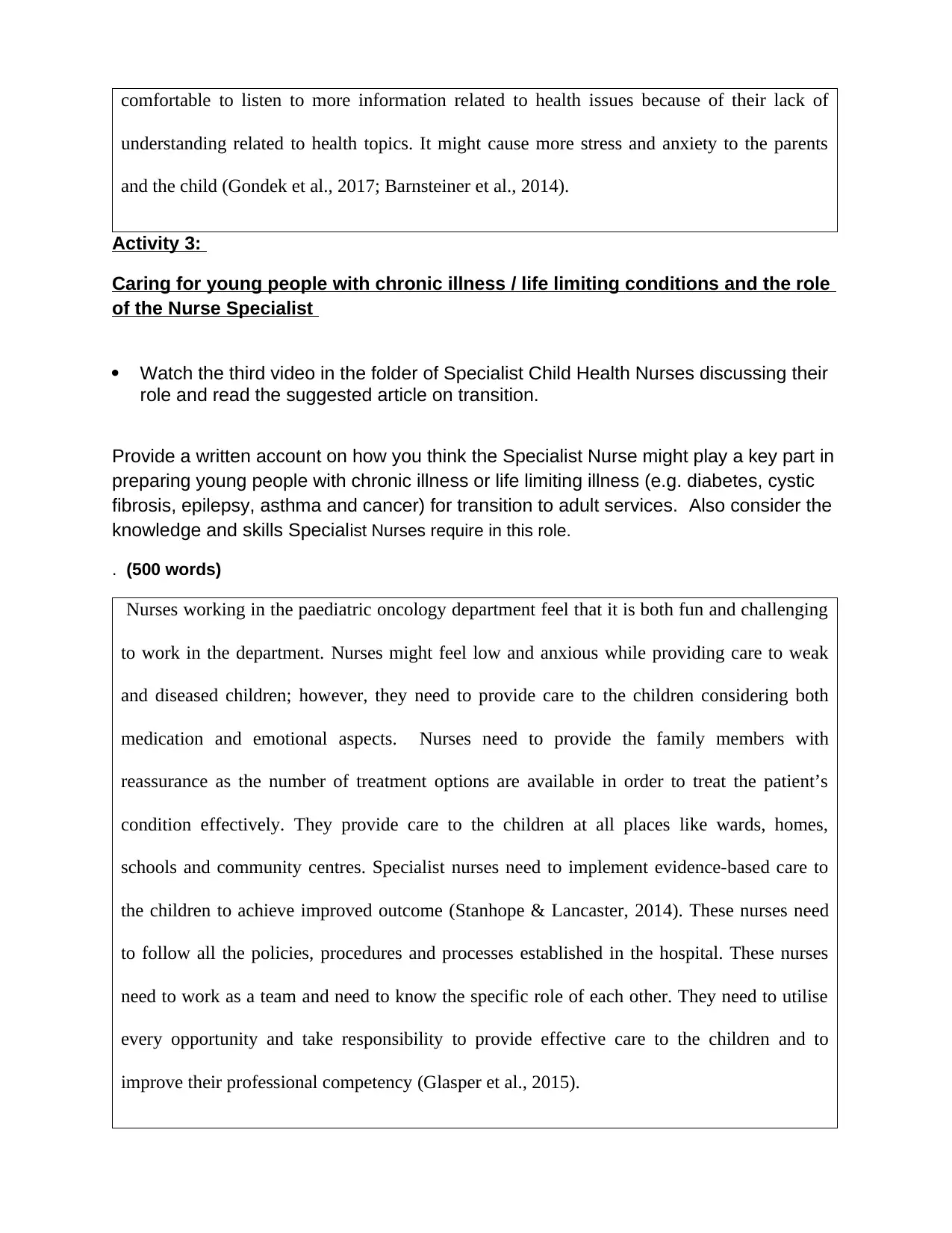
comfortable to listen to more information related to health issues because of their lack of
understanding related to health topics. It might cause more stress and anxiety to the parents
and the child (Gondek et al., 2017; Barnsteiner et al., 2014).
Activity 3:
Caring for young people with chronic illness / life limiting conditions and the role
of the Nurse Specialist
Watch the third video in the folder of Specialist Child Health Nurses discussing their
role and read the suggested article on transition.
Provide a written account on how you think the Specialist Nurse might play a key part in
preparing young people with chronic illness or life limiting illness (e.g. diabetes, cystic
fibrosis, epilepsy, asthma and cancer) for transition to adult services. Also consider the
knowledge and skills Specialist Nurses require in this role.
. (500 words)
Nurses working in the paediatric oncology department feel that it is both fun and challenging
to work in the department. Nurses might feel low and anxious while providing care to weak
and diseased children; however, they need to provide care to the children considering both
medication and emotional aspects. Nurses need to provide the family members with
reassurance as the number of treatment options are available in order to treat the patient’s
condition effectively. They provide care to the children at all places like wards, homes,
schools and community centres. Specialist nurses need to implement evidence-based care to
the children to achieve improved outcome (Stanhope & Lancaster, 2014). These nurses need
to follow all the policies, procedures and processes established in the hospital. These nurses
need to work as a team and need to know the specific role of each other. They need to utilise
every opportunity and take responsibility to provide effective care to the children and to
improve their professional competency (Glasper et al., 2015).
understanding related to health topics. It might cause more stress and anxiety to the parents
and the child (Gondek et al., 2017; Barnsteiner et al., 2014).
Activity 3:
Caring for young people with chronic illness / life limiting conditions and the role
of the Nurse Specialist
Watch the third video in the folder of Specialist Child Health Nurses discussing their
role and read the suggested article on transition.
Provide a written account on how you think the Specialist Nurse might play a key part in
preparing young people with chronic illness or life limiting illness (e.g. diabetes, cystic
fibrosis, epilepsy, asthma and cancer) for transition to adult services. Also consider the
knowledge and skills Specialist Nurses require in this role.
. (500 words)
Nurses working in the paediatric oncology department feel that it is both fun and challenging
to work in the department. Nurses might feel low and anxious while providing care to weak
and diseased children; however, they need to provide care to the children considering both
medication and emotional aspects. Nurses need to provide the family members with
reassurance as the number of treatment options are available in order to treat the patient’s
condition effectively. They provide care to the children at all places like wards, homes,
schools and community centres. Specialist nurses need to implement evidence-based care to
the children to achieve improved outcome (Stanhope & Lancaster, 2014). These nurses need
to follow all the policies, procedures and processes established in the hospital. These nurses
need to work as a team and need to know the specific role of each other. They need to utilise
every opportunity and take responsibility to provide effective care to the children and to
improve their professional competency (Glasper et al., 2015).
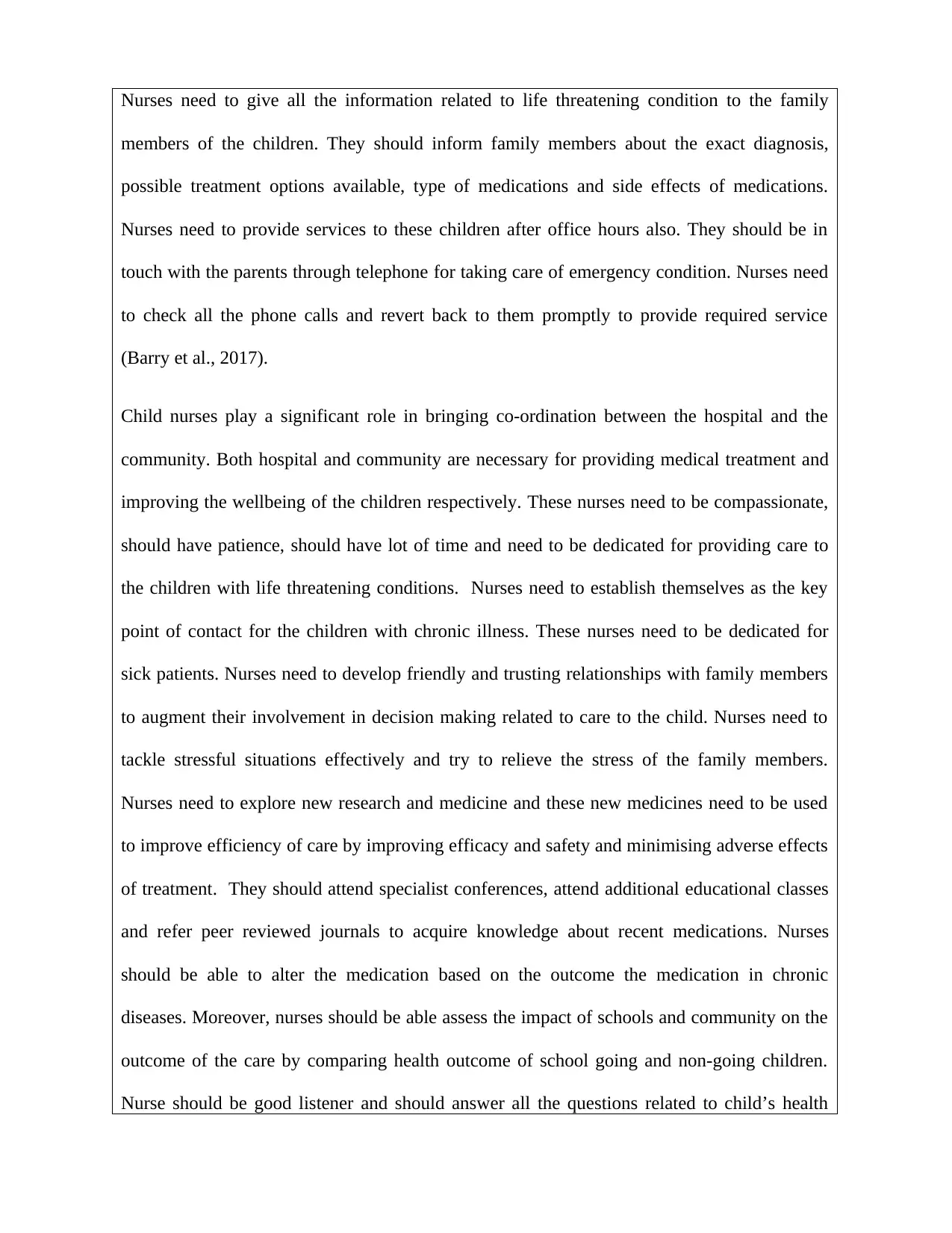
Nurses need to give all the information related to life threatening condition to the family
members of the children. They should inform family members about the exact diagnosis,
possible treatment options available, type of medications and side effects of medications.
Nurses need to provide services to these children after office hours also. They should be in
touch with the parents through telephone for taking care of emergency condition. Nurses need
to check all the phone calls and revert back to them promptly to provide required service
(Barry et al., 2017).
Child nurses play a significant role in bringing co-ordination between the hospital and the
community. Both hospital and community are necessary for providing medical treatment and
improving the wellbeing of the children respectively. These nurses need to be compassionate,
should have patience, should have lot of time and need to be dedicated for providing care to
the children with life threatening conditions. Nurses need to establish themselves as the key
point of contact for the children with chronic illness. These nurses need to be dedicated for
sick patients. Nurses need to develop friendly and trusting relationships with family members
to augment their involvement in decision making related to care to the child. Nurses need to
tackle stressful situations effectively and try to relieve the stress of the family members.
Nurses need to explore new research and medicine and these new medicines need to be used
to improve efficiency of care by improving efficacy and safety and minimising adverse effects
of treatment. They should attend specialist conferences, attend additional educational classes
and refer peer reviewed journals to acquire knowledge about recent medications. Nurses
should be able to alter the medication based on the outcome the medication in chronic
diseases. Moreover, nurses should be able assess the impact of schools and community on the
outcome of the care by comparing health outcome of school going and non-going children.
Nurse should be good listener and should answer all the questions related to child’s health
members of the children. They should inform family members about the exact diagnosis,
possible treatment options available, type of medications and side effects of medications.
Nurses need to provide services to these children after office hours also. They should be in
touch with the parents through telephone for taking care of emergency condition. Nurses need
to check all the phone calls and revert back to them promptly to provide required service
(Barry et al., 2017).
Child nurses play a significant role in bringing co-ordination between the hospital and the
community. Both hospital and community are necessary for providing medical treatment and
improving the wellbeing of the children respectively. These nurses need to be compassionate,
should have patience, should have lot of time and need to be dedicated for providing care to
the children with life threatening conditions. Nurses need to establish themselves as the key
point of contact for the children with chronic illness. These nurses need to be dedicated for
sick patients. Nurses need to develop friendly and trusting relationships with family members
to augment their involvement in decision making related to care to the child. Nurses need to
tackle stressful situations effectively and try to relieve the stress of the family members.
Nurses need to explore new research and medicine and these new medicines need to be used
to improve efficiency of care by improving efficacy and safety and minimising adverse effects
of treatment. They should attend specialist conferences, attend additional educational classes
and refer peer reviewed journals to acquire knowledge about recent medications. Nurses
should be able to alter the medication based on the outcome the medication in chronic
diseases. Moreover, nurses should be able assess the impact of schools and community on the
outcome of the care by comparing health outcome of school going and non-going children.
Nurse should be good listener and should answer all the questions related to child’s health
⊘ This is a preview!⊘
Do you want full access?
Subscribe today to unlock all pages.

Trusted by 1+ million students worldwide

issues (Pillitteri, 2013; Stanhope & Lancaster, 2014).
Paraphrase This Document
Need a fresh take? Get an instant paraphrase of this document with our AI Paraphraser
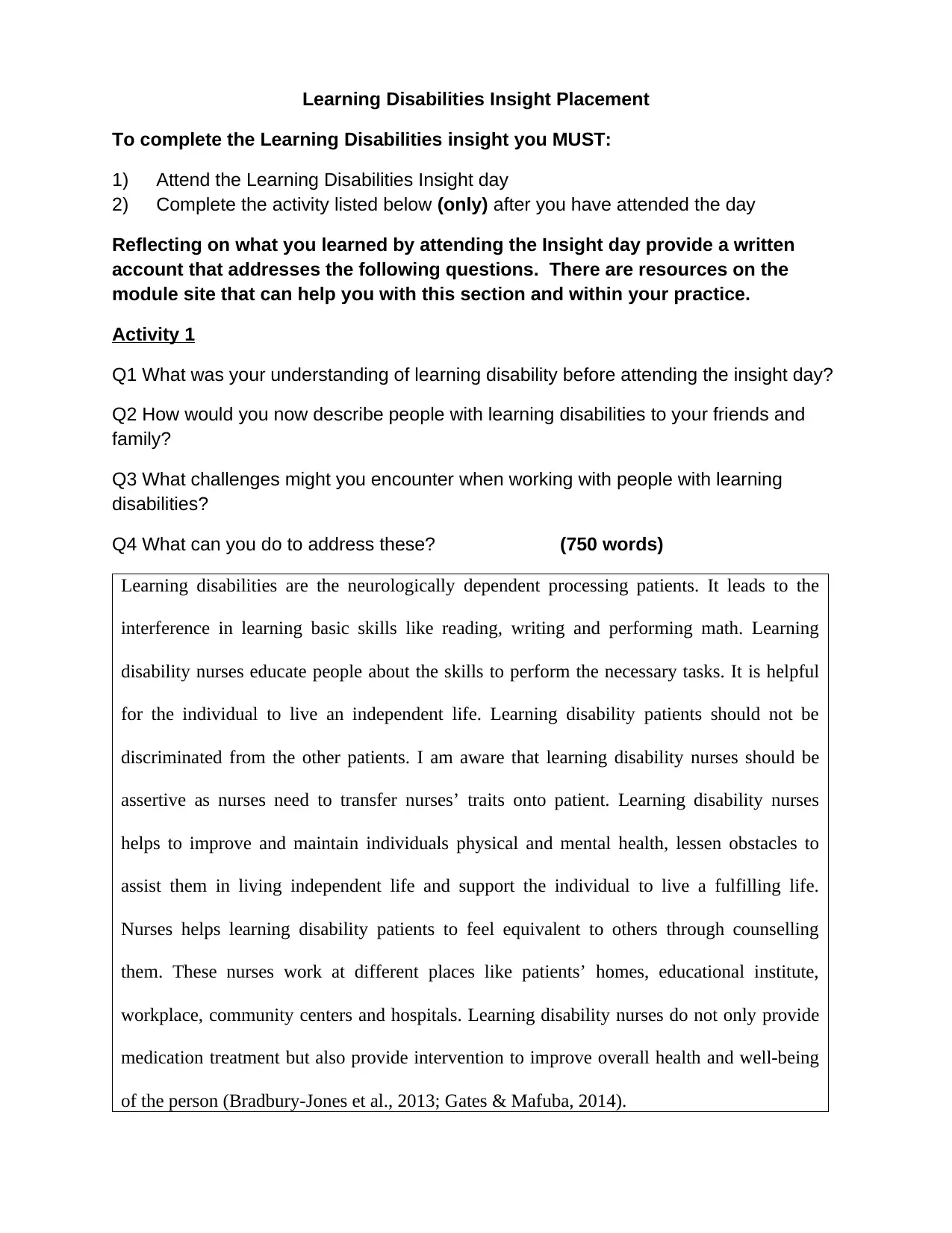
Learning Disabilities Insight Placement
To complete the Learning Disabilities insight you MUST:
1) Attend the Learning Disabilities Insight day
2) Complete the activity listed below (only) after you have attended the day
Reflecting on what you learned by attending the Insight day provide a written
account that addresses the following questions. There are resources on the
module site that can help you with this section and within your practice.
Activity 1
Q1 What was your understanding of learning disability before attending the insight day?
Q2 How would you now describe people with learning disabilities to your friends and
family?
Q3 What challenges might you encounter when working with people with learning
disabilities?
Q4 What can you do to address these? (750 words)
Learning disabilities are the neurologically dependent processing patients. It leads to the
interference in learning basic skills like reading, writing and performing math. Learning
disability nurses educate people about the skills to perform the necessary tasks. It is helpful
for the individual to live an independent life. Learning disability patients should not be
discriminated from the other patients. I am aware that learning disability nurses should be
assertive as nurses need to transfer nurses’ traits onto patient. Learning disability nurses
helps to improve and maintain individuals physical and mental health, lessen obstacles to
assist them in living independent life and support the individual to live a fulfilling life.
Nurses helps learning disability patients to feel equivalent to others through counselling
them. These nurses work at different places like patients’ homes, educational institute,
workplace, community centers and hospitals. Learning disability nurses do not only provide
medication treatment but also provide intervention to improve overall health and well-being
of the person (Bradbury-Jones et al., 2013; Gates & Mafuba, 2014).
To complete the Learning Disabilities insight you MUST:
1) Attend the Learning Disabilities Insight day
2) Complete the activity listed below (only) after you have attended the day
Reflecting on what you learned by attending the Insight day provide a written
account that addresses the following questions. There are resources on the
module site that can help you with this section and within your practice.
Activity 1
Q1 What was your understanding of learning disability before attending the insight day?
Q2 How would you now describe people with learning disabilities to your friends and
family?
Q3 What challenges might you encounter when working with people with learning
disabilities?
Q4 What can you do to address these? (750 words)
Learning disabilities are the neurologically dependent processing patients. It leads to the
interference in learning basic skills like reading, writing and performing math. Learning
disability nurses educate people about the skills to perform the necessary tasks. It is helpful
for the individual to live an independent life. Learning disability patients should not be
discriminated from the other patients. I am aware that learning disability nurses should be
assertive as nurses need to transfer nurses’ traits onto patient. Learning disability nurses
helps to improve and maintain individuals physical and mental health, lessen obstacles to
assist them in living independent life and support the individual to live a fulfilling life.
Nurses helps learning disability patients to feel equivalent to others through counselling
them. These nurses work at different places like patients’ homes, educational institute,
workplace, community centers and hospitals. Learning disability nurses do not only provide
medication treatment but also provide intervention to improve overall health and well-being
of the person (Bradbury-Jones et al., 2013; Gates & Mafuba, 2014).
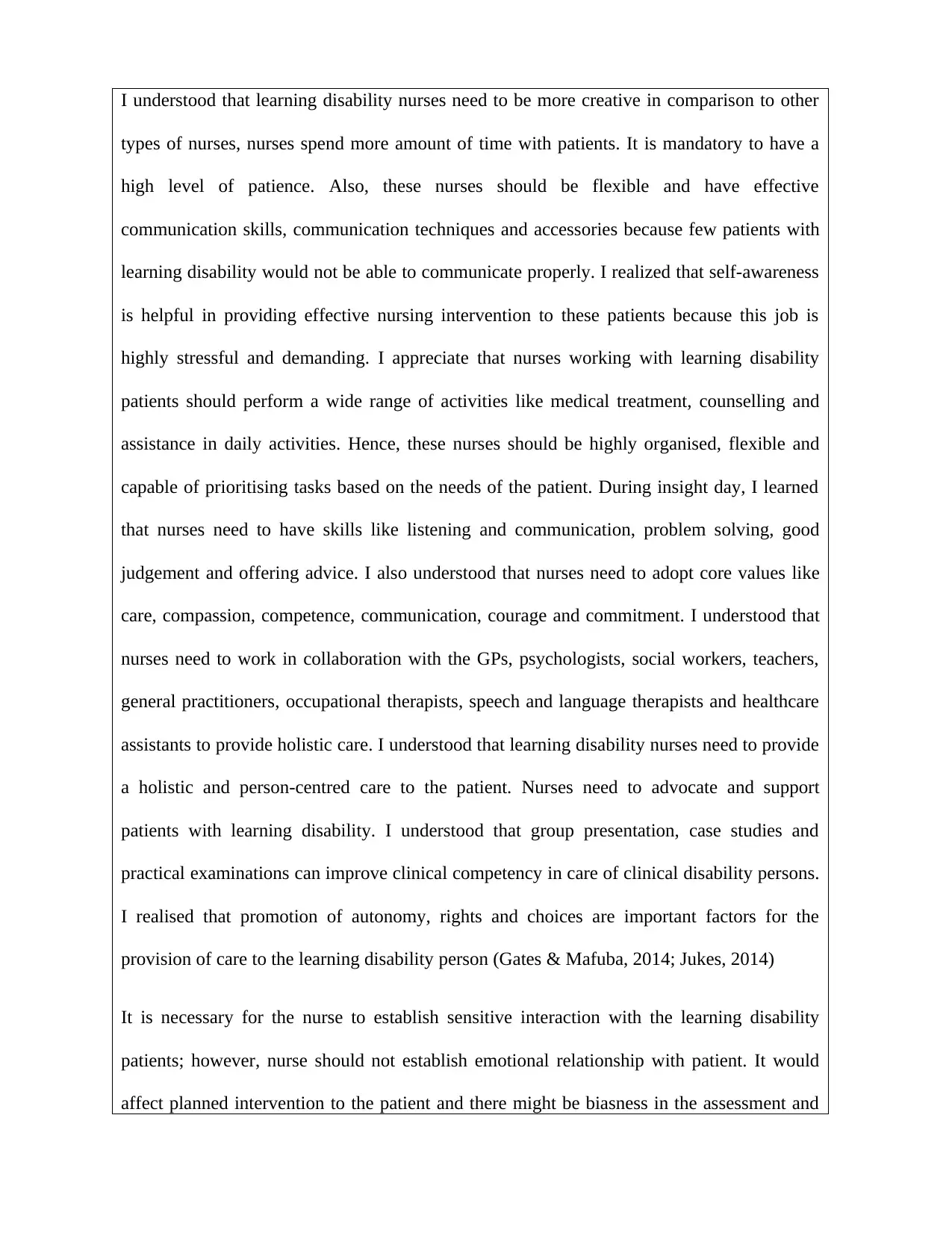
I understood that learning disability nurses need to be more creative in comparison to other
types of nurses, nurses spend more amount of time with patients. It is mandatory to have a
high level of patience. Also, these nurses should be flexible and have effective
communication skills, communication techniques and accessories because few patients with
learning disability would not be able to communicate properly. I realized that self-awareness
is helpful in providing effective nursing intervention to these patients because this job is
highly stressful and demanding. I appreciate that nurses working with learning disability
patients should perform a wide range of activities like medical treatment, counselling and
assistance in daily activities. Hence, these nurses should be highly organised, flexible and
capable of prioritising tasks based on the needs of the patient. During insight day, I learned
that nurses need to have skills like listening and communication, problem solving, good
judgement and offering advice. I also understood that nurses need to adopt core values like
care, compassion, competence, communication, courage and commitment. I understood that
nurses need to work in collaboration with the GPs, psychologists, social workers, teachers,
general practitioners, occupational therapists, speech and language therapists and healthcare
assistants to provide holistic care. I understood that learning disability nurses need to provide
a holistic and person-centred care to the patient. Nurses need to advocate and support
patients with learning disability. I understood that group presentation, case studies and
practical examinations can improve clinical competency in care of clinical disability persons.
I realised that promotion of autonomy, rights and choices are important factors for the
provision of care to the learning disability person (Gates & Mafuba, 2014; Jukes, 2014)
It is necessary for the nurse to establish sensitive interaction with the learning disability
patients; however, nurse should not establish emotional relationship with patient. It would
affect planned intervention to the patient and there might be biasness in the assessment and
types of nurses, nurses spend more amount of time with patients. It is mandatory to have a
high level of patience. Also, these nurses should be flexible and have effective
communication skills, communication techniques and accessories because few patients with
learning disability would not be able to communicate properly. I realized that self-awareness
is helpful in providing effective nursing intervention to these patients because this job is
highly stressful and demanding. I appreciate that nurses working with learning disability
patients should perform a wide range of activities like medical treatment, counselling and
assistance in daily activities. Hence, these nurses should be highly organised, flexible and
capable of prioritising tasks based on the needs of the patient. During insight day, I learned
that nurses need to have skills like listening and communication, problem solving, good
judgement and offering advice. I also understood that nurses need to adopt core values like
care, compassion, competence, communication, courage and commitment. I understood that
nurses need to work in collaboration with the GPs, psychologists, social workers, teachers,
general practitioners, occupational therapists, speech and language therapists and healthcare
assistants to provide holistic care. I understood that learning disability nurses need to provide
a holistic and person-centred care to the patient. Nurses need to advocate and support
patients with learning disability. I understood that group presentation, case studies and
practical examinations can improve clinical competency in care of clinical disability persons.
I realised that promotion of autonomy, rights and choices are important factors for the
provision of care to the learning disability person (Gates & Mafuba, 2014; Jukes, 2014)
It is necessary for the nurse to establish sensitive interaction with the learning disability
patients; however, nurse should not establish emotional relationship with patient. It would
affect planned intervention to the patient and there might be biasness in the assessment and
⊘ This is a preview!⊘
Do you want full access?
Subscribe today to unlock all pages.

Trusted by 1+ million students worldwide
1 out of 25
Related Documents
Your All-in-One AI-Powered Toolkit for Academic Success.
+13062052269
info@desklib.com
Available 24*7 on WhatsApp / Email
![[object Object]](/_next/static/media/star-bottom.7253800d.svg)
Unlock your academic potential
Copyright © 2020–2026 A2Z Services. All Rights Reserved. Developed and managed by ZUCOL.





